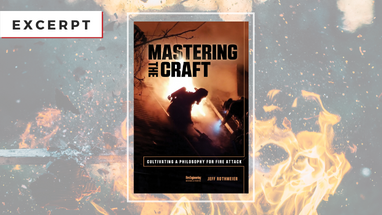May 31st 2024
Excerpt: Mastering the Craft - Cultivating a Philosophy for Fire Attack,
Book by Jeff Rothmeier
Aggression on the Fireground
It was midafternoon on a chilly day in a small community whose emergency needs could almost lull any first responder into believing their skills have a diminished purpose. This was a dangerous paradigm to be sure, but would those moments ever confront the unsuspecting? On this day, even a few emergencies would present an abnormal workload for these first responders. The first tones dropped to their pager for a motor vehicle accident (MVA). On an icy highway, they rolled several rigs out to perform traffic management while emergency medical service (EMS) providers tended to the injuries of the occupants. It was a normal run, one they had become experts at: staging, communications, and clean up. What they would encounter moments later would not have the same comforts afforded by this common response.
The volunteer department is not unlike any other. The membership is made of community members who engage in the craft of firefighting as a part-time job. Evening training events coupled with random emergency responses make up their duties. They have a vote to promote their officers, hold charitable events to raise money for equipment, and enjoy the fellowship throughout all these endeavors. They were the typical small community volunteer department.
Their standard training reviews the basics of fire, EMS, and rescue response. The challenge within the volunteer community is to balance the commitments of a full-time job with the needs of the rigorous profession that the all-hazard fire service has become. Very often in these types of departments, members are continually expected to seek more training hours and certifications, which some argue is asking too much of a part-time employee. This employee is usually not compensated well and gives much to the good of the department. Their contribution can be viewed minimally.
The fight for balance is a political one. Any firefighter knows the true nature of our battleground is so complex and demanding that any time spent engaging in its understanding and preparation is worthwhile. Any leader should consider the content of their subordinates’ abilities and whether willingness to strive for improvement wanes. Leadership’s duty is to assure that when they are needed, they will perform.
Amid this routine call, a second page sounded on the responder’s hips. The notification this time increased their heart rates; a structure fire in town was occurring with possible victim entrapment. All rigs but one were quickly identified to respond. Firefighters picked up their equipment as they rushed to their apparatus when they noticed a plume to the northwest of their position. The smoke confirmed the information held in the page: work awaited their arrival.
Due to the nature of volunteer work, rigs typically aren’t fully staffed until firefighters drive from their homes to the station. But today they had multiple apparatus responding immediately, so they arrived at the scene in record time. They were confronted with chaos not normally seen in this docile community and were now expected to perform in a manner that they had not previously conditioned themselves for. An advanced fire condition was impinging on the first floor of a ranch-style home. The condition cut off access and egress of a young child to the rear of the structure. The boy’s father was on scene frantically doing whatever he could to assist in the effort to save his son.
Ignite your passion and hone your skills with the wisdom offered within these pages. Seize the opportunity to become a true fire attack master—click now and embark on your journey towards excellence!


